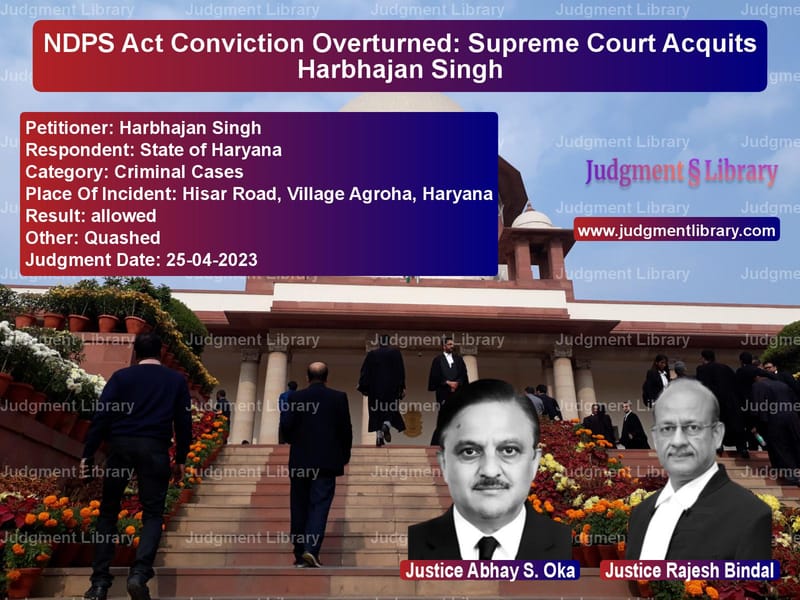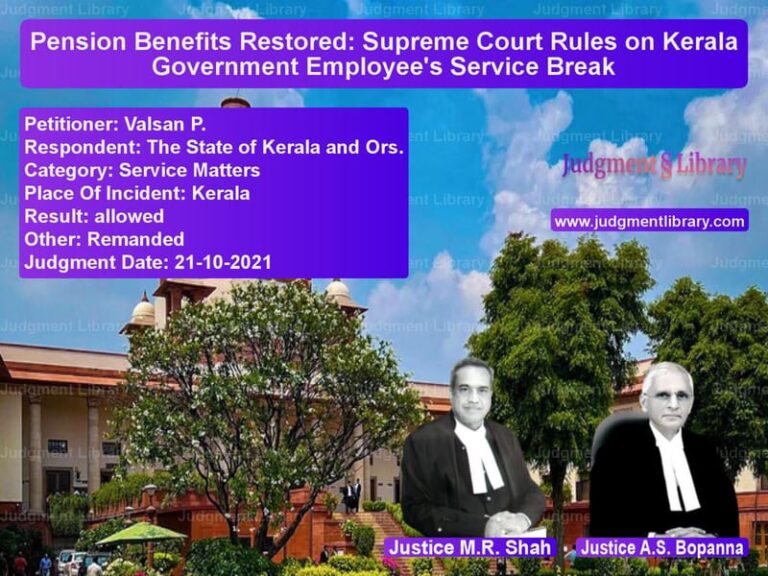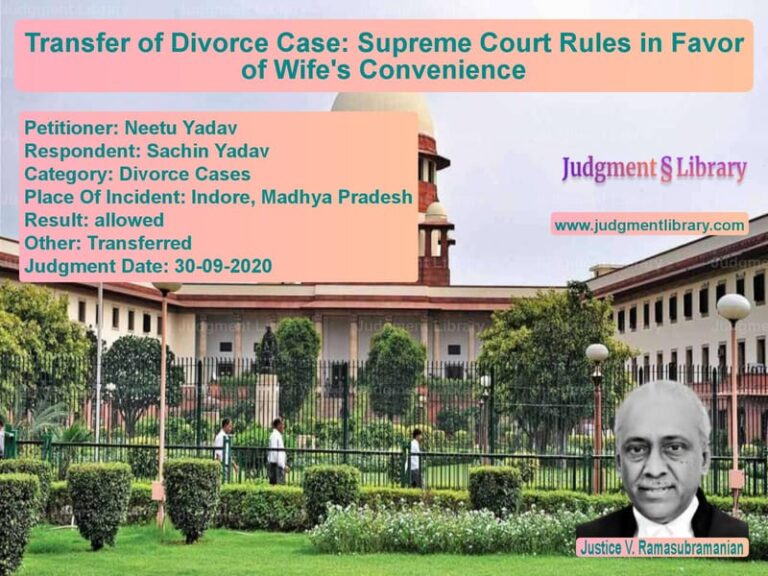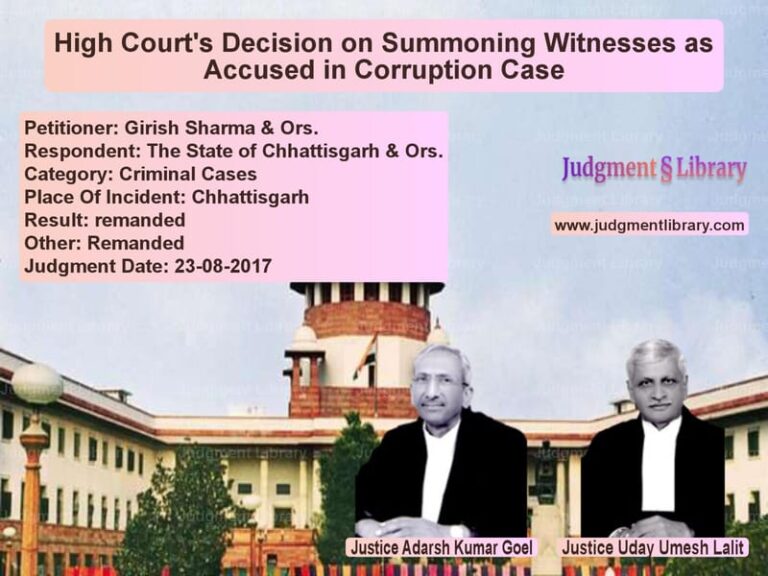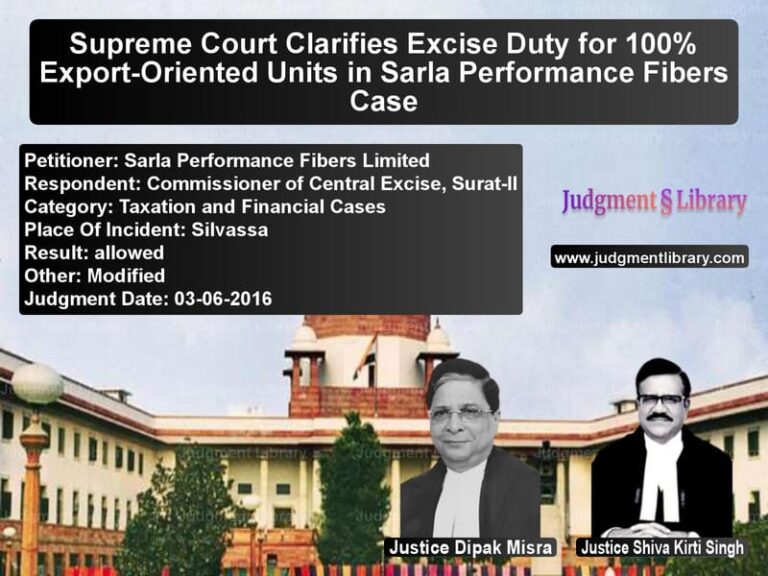NDPS Act Conviction Overturned: Supreme Court Acquits Harbhajan Singh
The Supreme Court of India has set aside the conviction of Harbhajan Singh, who was sentenced to 10 years under Section 25 of the Narcotic Drugs and Psychotropic Substances Act, 1985 (NDPS Act). The Court ruled that the prosecution failed to establish foundational facts proving that Harbhajan Singh had knowledge of his truck being used for transporting narcotics. This case is significant in clarifying the legal standards for vicarious liability under the NDPS Act.
Background of the Case
The case originates from an incident on May 15, 2000, when a truck bearing registration number PAT/2029 overturned near Hanuman Mandir, Hisar Road, Village Agroha, Haryana. The police, suspecting illegal substances in the truck, registered FIR No. 68 on May 16, 2000. Upon unloading the truck, law enforcement officers found bags containing contraband.
According to the prosecution, two witnesses—Ram Sarup (PW-6) and Naresh Kumar (PW-10)—informed the police that the accident took place at approximately 9:00 PM on May 15, 2000. They claimed that two men, identified as Joginder Singh (driver) and Gurmail Singh (cleaner), emerged from the vehicle and revealed that the truck belonged to Harbhajan Singh. The driver and cleaner left the scene to inform the owner but never returned.
After investigating the case, the police charged Harbhajan Singh under Section 25 of the NDPS Act, which penalizes owners of vehicles used for drug trafficking if they had knowledge of the illegal activity. The trial court convicted him on May 18, 2005, sentencing him to 10 years of imprisonment, which was upheld by the High Court on May 14, 2010. Harbhajan Singh then appealed to the Supreme Court.
Legal Issues Before the Supreme Court
The Supreme Court focused on the following legal questions:
- Did the prosecution prove that Harbhajan Singh had knowledge that his truck was being used for transporting narcotics?
- Did the burden of proof shift to the accused under the presumption of culpable mental state (Section 35 of the NDPS Act)?
- Was Harbhajan Singh’s conviction legally sustainable in the absence of direct evidence?
Arguments by the Appellant (Harbhajan Singh)
Harbhajan Singh’s defense team argued:
- Lack of Knowledge: There was no evidence proving that he knowingly allowed his truck to be used for drug transportation.
- Acquittal of Co-Accused: Joginder Singh and Gurmail Singh, who were initially identified as driver and cleaner, were acquitted after the key witnesses turned hostile.
- No Direct Evidence: The prosecution relied on circumstantial evidence, failing to establish a direct link between Harbhajan Singh and the drugs found in the truck.
- Burden of Proof Not Shifted: Section 35 of the NDPS Act requires the prosecution to first establish foundational facts before the burden shifts to the accused, which did not happen in this case.
Arguments by the Respondent (State of Haryana)
The State of Haryana, arguing for upholding the conviction, contended:
- Vicarious Liability: As the registered owner of the truck, Harbhajan Singh was responsible for how his vehicle was used.
- Failure to Prove Innocence: Since Harbhajan Singh claimed that the truck had been given on hire for transporting sand, he was required to provide evidence supporting this claim.
- Presumption of Knowledge: Given the large quantity of narcotics found, the owner should have been aware of what his vehicle was being used for.
Supreme Court’s Ruling
1. Knowledge Requirement Under Section 25 of the NDPS Act
The Court held that a conviction under Section 25 of the NDPS Act requires proving that the owner of the vehicle knowingly permitted its use for drug trafficking. In this case, the prosecution failed to present any material evidence linking Harbhajan Singh to the offense.
2. Failure to Establish Foundational Facts
The Court emphasized that under Section 35 of the NDPS Act, the burden of proof does not shift to the accused unless the prosecution first establishes the basic facts. The Court cited its earlier ruling in Noor Aga v. State of Punjab, stating:
“As this section imposed a heavy reverse burden on an accused, the condition for the applicability of this and other related sections would have to be spelt out on facts, and it was only after the prosecution had discharged the initial burden to prove the foundational facts that Section 35 would come into play.”
3. Acquittal of Co-Accused and Lack of Credible Evidence
The Court noted that the key prosecution witnesses turned hostile, and no credible evidence remained to link Harbhajan Singh to the contraband. The driver and cleaner of the truck were acquitted, and the prosecution did not challenge their acquittal.
4. Violation of Legal Principles
The Supreme Court found that the trial court and High Court had wrongly shifted the burden of proof onto the accused, stating:
“The primary error committed by the Courts below while convicting the Appellant is that the onus is sought to be shifted on him to prove his innocence without the foundational facts having been proved by the prosecution.”
Key Excerpt from the Judgment
The Court held:
“In the entire evidence led by the prosecution, no material was produced against the Appellant to discharge the initial burden to prove the foundational facts that the offense was committed with the knowledge and consent of the Appellant. He has been convicted merely on the ground that he was the registered owner of the truck. This conviction cannot be legally sustained.”
Conclusion
The Supreme Court quashed the conviction of Harbhajan Singh and set aside the previous judgments. The ruling reinforced the principle that under the NDPS Act, an accused cannot be convicted based solely on ownership of a vehicle without clear proof of knowledge and intent. This decision highlights the need for strict adherence to procedural safeguards to prevent wrongful convictions under stringent laws like the NDPS Act.
Petitioner Name: Harbhajan Singh.Respondent Name: State of Haryana.Judgment By: Justice Abhay S. Oka, Justice Rajesh Bindal.Place Of Incident: Hisar Road, Village Agroha, Haryana.Judgment Date: 25-04-2023.
Don’t miss out on the full details! Download the complete judgment in PDF format below and gain valuable insights instantly!
Download Judgment: harbhajan-singh-vs-state-of-haryana-supreme-court-of-india-judgment-dated-25-04-2023.pdf
Directly Download Judgment: Directly download this Judgment
See all petitions in Drug Possession Cases
See all petitions in Bail and Anticipatory Bail
See all petitions in Judgment by Abhay S. Oka
See all petitions in Judgment by Rajesh Bindal
See all petitions in allowed
See all petitions in Quashed
See all petitions in supreme court of India judgments April 2023
See all petitions in 2023 judgments
See all posts in Criminal Cases Category
See all allowed petitions in Criminal Cases Category
See all Dismissed petitions in Criminal Cases Category
See all partially allowed petitions in Criminal Cases Category

